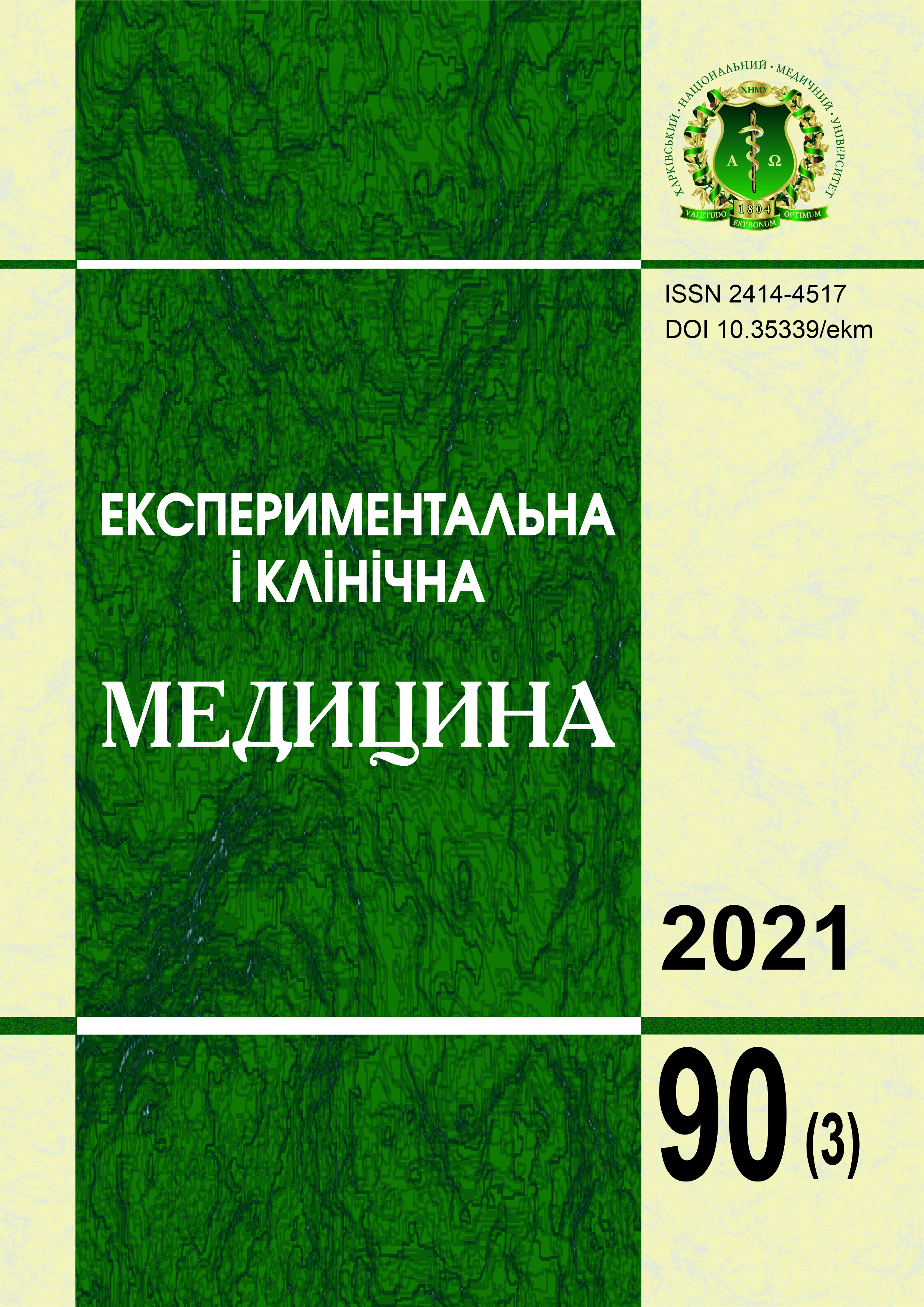Abstract
The study of the state of cognitive functioning of patients who underwent Сardiо-Surgery Interventions (CSI) was studied to take into account the data obtained when creating rehabilitation programs for this category of patients. We examined 700 patients who were treated at the State Institution "Heart Institute of the Ministry of Health of Ukraine" after undergoing CSI with an artificial circulation procedure. First, the general state of cognitive functioning in the sample was analyzed. Then, in front of the examined patients, we selected a group of patients with manifestations of postoperative cognitive dysfunction (POCD), numbering 504 persons. Thus, in the second stage of the work, the indicators of patients in this group were compared with the indicators of patients who underwent CSI, without signs of CSI, the number of 196 persons taken from the same sample. As a result of the study, significant cognitive impairment was revealed in more than 70% of patients who underwent CSI. This manifested itself in the slowing down of mental processes and reduced switching of attention, manifestations of inhibition, rigidity of thinking, exhaustion, decreased speed and efficiency of memorization; in general, a total decrease in the speed and efficiency of cognitive processes, which is consistent with the data of modern scientific literature on the significant manifestations of cognitive deficits in the postoperative period after cardiac interventions. The answer to the question of identifying defensive factors inherent in a group of patients without signs of cognitive deficits will be obtained as a result of our further work. The identified patterns should be taken into account in the development of treatment, rehabilitation and prevention measures for patients who have suffered from CSI.
Keywords: cardiac surgery, artificial blood circulation, postoperative cognitive dysfunction, cognitive functioning.
References
Berger M, Terrando N, Smith SK, Browndyke JN, Newman MF, Mathew JP. Neurocognitive Function after Cardiac Surgery: From Phenotypes to Mechanisms. Anesthesiology. 2018;129(4):829–51. DOI: 10.1097/ALN.0000000000002194. PMID: 29621031.
Jurga J, Tornvall P, Dey L, van der Linden J, Sarkar N, von Euler M. Does Coronary Angiography and Percutaneous Coronary Intervention Affect Cognitive Function? Am J Cardiol. 2016;118:1437–41. DOI: 10.1016/j.amjcard.2016.08.003. PMID: 27634030.
Auffret V, Campelo-Parada F, Regueiro A, Del Trigo M, Chiche O, Chamandi C, et al. Serial Changes in Cognitive Function Following Transcatheter Aortic Valve Replacement. J Am Coll Cardiol. 2016;68:2129–41. DOI: 10.1016/j.jacc.2016.08.046. PMID: 27692728.
Mokin M, Zivadinov R, Dwyer MG, Lazar RM, Hopkins LN, Siddiqui AH. Transcatheter aortic valve replacement: perioperative stroke and beyond. Expert Rev Neurother. 2017;17(4):327–34. DOI: 10.1080/14737175.2017.1253475. PMID: 27786568.
Czok M, Pluta MP, Putowski Z, Krzych ŁJ. Postoperative Neurocognitive Disorders in Cardiac Surgery: Investigating the Role of Intraoperative Hypotension. A Systematic Review. Int J Environ Res Public Health. 2021;18(2):786. DOI: 10.3390/ijerph18020786. PMID: 33477713.
Mathew JP, White WD, Schinderle DB, Podgoreanu MV, Berger M, Milano CA, Laskowitz DT, Stafford-Smith M, Blumenthal JA, Newman MF. Neurologic Outcome Research Group of The Duke Heart C Intraoperative magnesium administration does not improve neurocognitive function after cardiac surgery. Stroke. 2013;44(12):3407–13. DOI: 10.1161/STROKEAHA.113.002703. PMID: 24105697.
Ottens TH, Dieleman JM, Sauer AM, Peelen LM, Nierich AP, de Groot WJ, et al. CSS Effects of dexamethasone on cognitive decline after cardiac surgery: a randomized clinical trial. Anesthesiology. 2014;121(3):492–500. DOI: 10.1097/ALN.0000000000000336. PMID: 25225745.
Schoenenberger AW, Zuber C, Moser A, Zwahlen M, Wenaweser P, Windecker S, et al. Evolution of Cognitive Function After Transcatheter Aortic Valve Implantation. Circ Cardiovasc Interv. 2016;9(10):e003590. DOI: 10.1161/CIRCINTERVENTIONS.116.003590. PMID: 27655999.
Haussig S, Mangner N, Dwyer MG, Lehmkuhl L, Lucke C, Woitek F, et al. Effect of a Cerebral Protection Device on Brain Lesions Following Transcatheter Aortic Valve Implantation in Patients With Severe Aortic Stenosis: The CLEAN-TAVI Randomized Clinical Trial. JAMA. 2016;316(6):592–601. DOI: 10.1001/jama.2016.10302. PMID: 27532914.
Evered L, Scott DA, Silbert B, Maruff P. Postoperative cognitive dysfunction is independent of type of surgery and anesthetic. Anesth Analg. 2011 May;112(5):1179–85. DOI: 10.1213/ANE.0b013e318215217e. PMID: 21474666
Larsen MH, Draegert C, Vedel AG, Holmgaard F, Siersma V, Nilsson JC, Rasmussen LS. Long-term survival and cognitive function according to blood pressure management during cardiac surgery. A follow-up. Acta Anaesthesiol. Scand. 2020;64(7):936–44. DOI: 10.1111/aas.13595. PMID: 32270483.
Berger M, Nadler JW, Browndyke J, Terrando N, Ponnusamy V, Cohen HJ, et al. Postoperative Cognitive Dysfunction: Minding the Gaps in Our Knowledge of a Common Postoperative Complication in the Elderly. Anesthesiol Clin. 2015;33(3):517–50. DOI: 10.1016/j.anclin.2015.05.008. PMID: 26315636.
Rasmussen LS, Larsen K, Houx P, Skovgaard LT, Hanning CD, Moller JT. Dysfunction IgTISoPC: The assessment of postoperative cognitive function. Acta Anaesthesiol Scand. 2001;45(3):275–89. DOI: 10.1034/j.1399-6576.2001.045003275.x. PMID: 11207462.
Browndyke JN, Berger M, Harshbarger TB, Smith PJ, White W, Bisanar TL, et al. Resting-State Functional Connectivity and Cognition After Major Cardiac Surgery in Older Adults without Preoperative Cognitive Impairment: Preliminary Findings. J Am Geriatr Soc. 2017;65:e6–e12. DOI: 10.1111/jgs.14534. PMID: 27858963.

